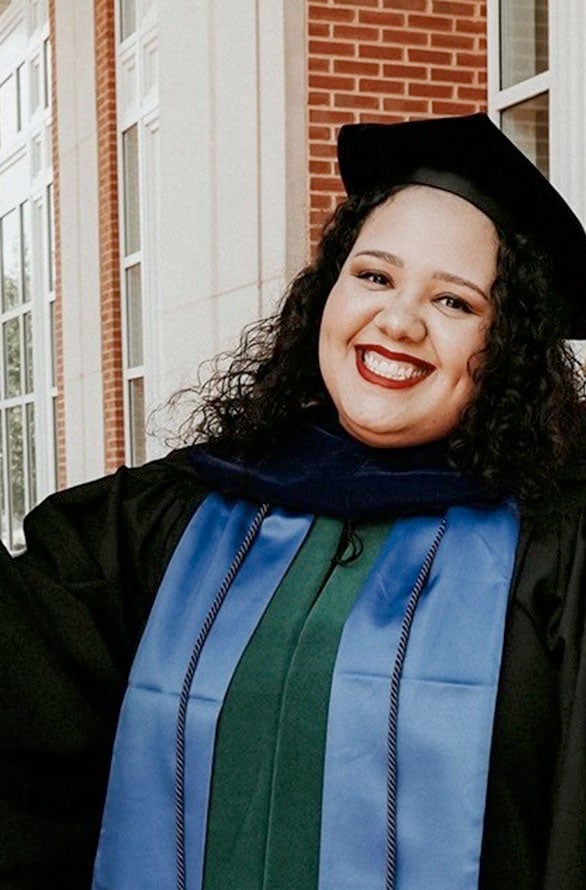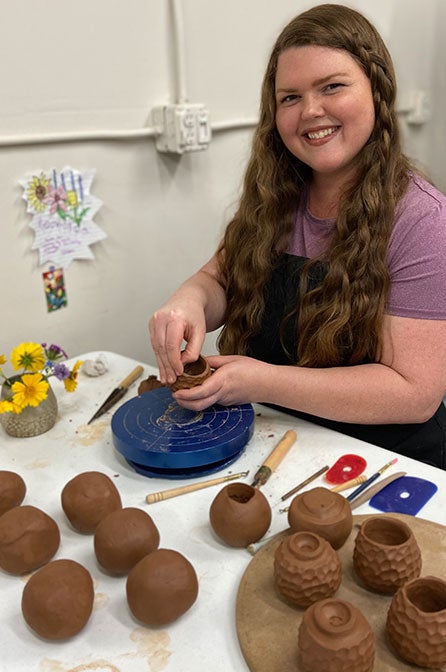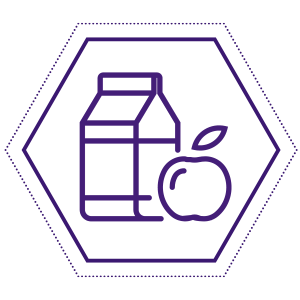Seven Steps to a better you

Alumni share their expert advice on health and happiness
Wellness can be hard to define and even harder to achieve. It’s not just about physical health, either. It’s mental, emotional, even financial. There’s a lot you can do to improve your wellness. But where to start? We tapped seven alumni who are experts in different areas of wellness and asked them to share their best tips and their own inspiring health journeys. They’ve dedicated their careers to helping others be well and are full of health advice that can help you, too.

Pro tip to beginning meditation: Start by counting your breath. Try to breathe in for a count of four and exhale for a count of four. Repeat. You can also try using an anchor phrase or mantra. During the pandemic, Price used “I am (inhale) safe (exhale).”

That’s because after being diagnosed with kidney disease in 2010 and undergoing transplant surgery in 2016, doctors didn’t remove her bad kidney; they added a healthy one.
Price was a 29-year-old working at ECU as the finance coordinator for Project HEART, a program that aids at-risk students, when a routine checkup revealed her kidneys were only functioning at 21%. “It was a shock. Anytime anything happens in your life that is that life-changing, you can’t go back and be the person you were before,” Price says.
Kidney disease often has no symptoms in its early stages and can go undetected until it is very advanced. Yet each year, kidney disease kills more people than breast or prostate cancer, according to the National Institute of Diabetes and Digestive and Kidney Diseases. Kidneys work 24 hours a day to filter toxins out of the body. When kidneys fail, people need dialysis to filter their blood artificially.
Price’s doctor was proactive about putting her on the transplant list. But she would eventually need to go on dialysis before receiving a new kidney, a process that required hours-long treatments multiple times a week. The ordeal pushed her to try meditation.
“Meditation was a way to mentally handle dialysis, because at that point I felt like life was happening without me,” she says.
Thankfully, Price’s cousin was a match for her transplant, and her body took to the new kidney immediately with no problems, she says. During her recovery, she started doing yoga in addition to meditation. “I wanted to do everything possible to maintain my health. It’s a gift that I want to protect and honor,” Price says.
Eventually, she became a yoga teacher, with the goal of bringing yoga to populations who need it, such as those on dialysis and in the transplant community. Price teaches virtual classes at YogiVibes Studio in Greenville and has her own subscription-based platform with a library of online classes.
As an advocate for health and transplant awareness, Price is a North Carolina advisory board member for the National Kidney Foundation. During the pandemic, she taught breathwork and meditation classes for the organization.
“A lot of people think meditation is about stopping your thinking, but it’s really just lessening the tabs on your mental computer,” she says. She is also the minority liaison for the North Carolina Transplant Athletes, which is “just like the Olympics, but all the athletes have had transplants,” she says.
The biggest lesson she’s learned from her transplant experience is the importance of taking time for wellness.
“Don’t wait for something to happen to take your health seriously,” she says.

As a first-generation college student, “it took a village to get me through school,” Vazquez says. “School counselors made college seem within my reach, and there were people at ECU who took me under their wing. I realized that I wanted to do that for others, too, and support those students who had to go through the same trials and situations I did.”
Research shows untreated children with anxiety disorders are at higher risk to perform poorly in school, miss out on important social experiences and engage in substance abuse. Vazquez specifically focuses on equity access in education, Latinx family functioning and community development, and ethnic and minority issues.
We’re getting better at understanding mental health. The pandemic increased awareness, Vazquez says. “The stigma isn’t completely gone, but the pandemic made people realize how much mental health really affects them.”
We’re realizing school isn’t what it used to be. “Issues with race, ethnicity, rights, feeling safe at school – students are going to want to talk about the things they see happening in their community,” Vazquez says. “Our focus is on making sure students are able to be successful and to address things that don’t necessarily happen in the classroom but affect their work in school. Counselors are there to be their advocate.”
We’re recognizing the importance of setting healthy boundaries. “A lot of times when we say self-care, we imagine extravagant bubble baths or candles, but mental health and taking care of yourself means setting boundaries and doing mundane things to make sure you get through the day,” Vazquez says. Her advice: It’s OK to say no. “One boundary I have with my students is give me two days to email you back.”

It took a village to get me through school. … I realized that I wanted to do that for others, too, and support those students who had to go through the same trials and situations I did.

There was a need that wasn’t being met here. There’s no other physical therapist in my town,” she says. “The elderly community especially has been very vocal about being appreciative.

“There was a need that wasn’t being met here. There’s no other physical therapist in my town,” she says. “The elderly community especially has been very vocal about being appreciative.” Patients most often come to Hernandez with back pain, hip pain or concerns about balance and falling.
The myth: If you use your body too much, it will wear out. “That’s a misconception. The body responds positively to exercise and movement and physical work. It’s designed to do those things,” Hernandez says. What it’s not designed to do? Too much sitting, too much working in front of the computer or too much sitting in a car during long commutes.
The reality: Keep track of your symptoms and know when to get help. “What I typically say to patients experiencing discomfort is to continue with life as usual.
Most issues will resolve themselves in four to six weeks,” Hernandez says. She suggests going for a walk or trying light stretching. “See how your body responds. If the pain is persistent and interfering with your life, it’s time to get some physical therapy help,” she adds.
The advice: Wellness is making small decisions every day. “When you do that over a lifetime, that’s how you stay well into your senior years,” she says.

“I was struggling with wanting to control everything — trying to weigh and measure, track calories and be restrictive in a hypervigilant way,” she says.
The restriction would trigger binge episodes, when she’d consume thousands of calories in one sitting.
“Then I would feel completely out of control with food. With bingeing would come a lot of shame and guilt,” Woolard says.
Binge eating disorder is the most common eating disorder in the United States. For Woolard, a healthier way was accessible through therapy and pottery. As an apprentice at The Village Potters Clay Center in Asheville, Woolard works in the studio loading kilns, mixing glazes and getting mentorship from master potters.
“One of the first classes I took in Asheville was making your own dinnerware. When I started using it to eat my meals, it was really grounding and brought joy to that experience of eating, which was painful in the past,” she says. “It really encouraged me to slow down and appreciate the food, because the pottery was creating this almost sacred ritual.”
Woolard sells her pottery online, and hopes her handmade cups, bowls and plates encourage others to eat mindfully and with joy instead of fear.
“It’s coming to eating from a place of gratitude and a source of nutrition rather than punishment and restriction,” Woolard says. Pottery has taught her to let go of that need for control, too. “You never know what is going to happen in the kiln,” she says. “Clay does what it wants to do.”

Pro tip to eat more mindfully: Whenever you sit down to enjoy your food, spend time taking in the colors, smells, textures and flavors. Try to avoid distractions like eating in front of the TV, and consider taking three deep breaths before starting the meal.

Pro tip for wellness during COVID-19: Don’t be afraid to go to your doctors. Yes, you may have to wear a mask and have your temperature checked, but if you’ve been putting something off, my advice is go see your doctor.

“I like to work with hands because your upper extremities are so useful. If something happens to one of your hands and you can’t use it, it really affects your daily function. How do you take the cap off the toothpaste? How do you tie your shoes? I love watching the healing process,” he says.
Favorite patient story: There was a young girl who was attacked by a shark. She had a lot of trauma and ended up losing her leg and a few fingers. I worked with her for over a year through multiple surgeries.
Initially, I helped with wound care, then made splints for her hands to position her fingers in an anatomically good place. Once she healed enough, we worked on range of motion in those fingers and on learning how to use some adaptive equipment like elastic shoelaces and special handles for hairbrushes so she could hold them better.
Eventually, she could do things like put makeup on by herself again or open the clasp on a bracelet. She is probably the most courageous and determined person I have ever worked with. Now she has near-normal use of both her hands. To have the opportunity to work with her holds a special place in my heart. To help her and her family go through that process was really special.

“The nutrition program at ECU is the reason why I’m here today at my dream job,” she says.
What I see on the job: “At Levine Children’s outpatient center, all the kids I see have some sort of gastrointestinal disorder,” Bird says. “That might mean they have a feeding difficulty or trouble swallowing or are not gaining enough weight. I make sure they get enough nutrition to grow adequately.”
My advice for parents: “Variety is key. A lot of kids get in a rut eating the same few foods. That’s not providing them with a full, nutritionally complete diet,” Bird says. “A child needs to try a food almost 20 times before they know if they like it or not. I always push parents to try, try, try.”
What I eat for breakfast: “At home, I’ll eat eggs or avocado toast and berries. If I’m on the go, I like chia seed pudding with peanut butter,” she says.

The nutrition program at ECU is the reason why I’m here today at my dream job.

A financial advisor should help broaden your horizons when it comes to investment education and knowing your options. Moreover, they can help you come up with a plan to help your dollars work harder for you.

With all this talk about your mind and body, don’t forget about your wallet. If your finances are not in order, it can have a direct impact on your overall well-being. In a national survey, 48% of U.S. adults reported losing sleep, at least occasionally, about a money issue in the last year.
Step 1. Have a conversation with someone you trust. “A financial advisor should help broaden your horizons when it comes to investment education and knowing your options. Moreover, they can help you come up with a plan to help your dollars work harder for you,” says McGilvary.
Step 2. Do something on a systematic basis. “Even just $50 or $100 a month adds up over time. Just get started. Crumbs make biscuits,” he says.
Step 3. Get the best return on your investment. “In my opinion, the best way to pursue return potential on your dollar in today’s low interest rate environment is by investing in the stock market,” he says.